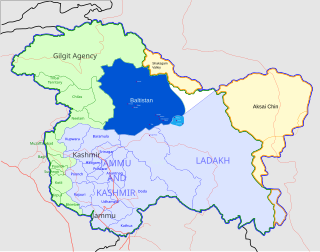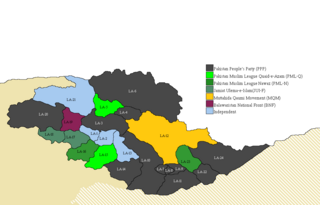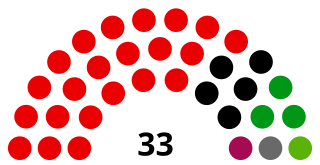Related Research Articles

The administrative units of Pakistan refers to the subnational administrative divisions that play a role in the governance of Pakistan. The country is composed of four provinces and one federal territory: the provinces of Balochistan, Punjab, Sindh, Khyber Pakhtunkhwa, and the federally-administered Islamabad Capital Territory. Additionally, Pakistan also administers two autonomous territories in the disputed region of Kashmir: Gilgit-Baltistan and Azad Jammu and Kashmir. Due to the ongoing Kashmir dispute with neighbouring India, it also claims sovereignty over the union territories of Ladakh and Jammu and Kashmir, but has not exercised administrative authority over either region since its independence and subsequent war with India in 1947. All of Pakistan's provinces and territories are subdivided into divisions, which are further subdivided into districts, and then tehsils, which are again further subdivided into union councils.

Baltistan, also known as Baltiyul or Little Tibet, is a mountainous region in Gilgit-Baltistan, Pakistan-administered Kashmir. It is located near the Karakoram mountains just south of K2, and borders Gilgit to the west, China's Xinjiang to the north, Ladakh to the southeast, and the Kashmir Valley to the southwest. Its average altitude is over 3,350 metres (10,990 ft).

Chitral District was the largest district in the Khyber-Pakhtunkhwa province of Pakistan, covering an area of 14,850 km², before splitting into Upper Chitral District and Lower Chitral District in 2018. Part of the Malakand Division, it is the northernmost district of Pakistan. It shares a border with Gilgit-Baltistan to the east, with Kunar, Badakshan and Nuristan provinces of Afghanistan to the north and west, and with the Khyber-Pakhtunkhwa districts of Swat and Dir to the south. A narrow strip of Wakhan Corridor separates Chitral from Tajikistan in the north.
Balawaristan (Urdu:بلاورستان) is the historical name of Gilgit-Baltistan that has regained some prevalence in recent years through political movements in Pakistan. The archaic English spelling for the name was Boloristan or Baloristan, and its first known documented usage is in Chinese sources from the 8th century AD. Balawaristan includes Chitral, Gilgit, Skardu, Hunza, Nagar, Ishkoman, Punial and Yasin. In addition, the regions of Baltistan, Ladakh are also considered to be a part of Balawaristan by the nationalist parties of Gilgit.

Gilgit District is one of the districts of the Gilgit–Baltistan territory in northern Pakistan. It was formed in 1970 when Gilgit–Baltistan was federally administered as the "Northern Areas". It is bounded by the Wakhan Corridor (Afghanistan) to the north; Xinjiang (China) to the northeast and east; Skardu, Astore and Diamer to the south; and Ghizer District to the west. The town of Gilgit is the capital of Gilgit District. According to the 1998 census Gilgit District had a population of 243,324.

The Gilgit-Baltistan United Movement (GBUM) is a political movement of Gilgit-Baltistan based in Skardu, Pakistan. It demands a fully autonomous state consisting of Gilgit and Baltistan, formerly known as the Northern Areas.

Gilgit-Baltistan, formerly known as the Northern Areas, is a region administered by Pakistan as an administrative territory, and constituting the northern portion of the larger Kashmir region which has been the subject of a dispute between India and Pakistan since 1947, and between India and China from somewhat later. It is the northernmost territory administered by Pakistan. It borders Azad Kashmir to the south, the province of Khyber Pakhtunkhwa to the west, the Wakhan Corridor of Afghanistan to the north, the Xinjiang region of China, to the east and northeast, and the Indian-administered union territories Jammu and Kashmir and Ladakh to the southeast.
There are separatist movements in Pakistan which are based on ethnic and regional nationalism, including independence movements in Balawaristan, Sindh, Pashtunistan and Balochistan. The government of Pakistan has attempted to subdue these separatist movements.

Syed Mehdi Shah is the first Chief minister of Gilgit-Baltistan. The post was created under Presidential Order For Govrnance 2009 for Gilgit Baltistan and First Leglastive assembly came into being and Mehdi Shah was elected as chief minister of province Gilgit Baltistan. He also served as the President of Gilgit-Baltistan chapter of the Pakistan Peoples Party.

Gilgit Baltistan is an administrative territory of Pakistan, disputed by India that borders the province of Khyber Pakhtunkhwa to the west, Azad Kashmir to the southwest, Wakhan Corridor of Afghanistan to the northwest, the Xinjiang Uyghur Autonomous Region of China to the north, and the Indian administrated region of Jammu and Kashmir to the south and southeast.
Human rights abuses in Kashmir is an issue connected to the territory's disputed and divided status with respect to the conflict between India and Pakistan. The issue pertains to abuses in both the region administered by India and the region administered by Pakistan, particularly since the beginning of the dispute in 1947 after the partition of India.
August 2012 Mansehra Shia massacre refers to the massacre of 25 Shia Muslim residents of Gilgit-Baltistan travelling from Rawalpindi, Punjab to Gilgit, Gilgit Baltistan in Pakistan. The bus was stopped in Mansehra District and the people were killed after checking their identification cards which showed they were from the Shia community by individuals dressed in Military uniforms. Darra Adam Khel faction of Tehrik-i-Taliban Pakistan has claimed the responsibility for the attack.

The 1988 Gilgit massacre refers to the mass killing and rape of Gilgit-Baltistan's former Shia-majority which revolted against military dictator Muhammad Zia-ul-Haq's Sunni Islamist regime, which was responsible for the vehement persecution of religious minorities as part of its Islamization program in Pakistan. The massacre was preceded by anti-Shia riots in early May 1988, which were caused by a dispute over the sighting of the moon for Eid al-Fitr after Ramadan between Shia Muslims and Sunni Muslims. Local Sunnis, who were still fasting for Ramadan, had attacked the local Shias who had announced their commencement of Eid celebrations in Gilgit City, leading to violent clashes between the two sects. In response to the riots and revolt against Zia-ul-Haq's regime, the Pakistan Army led an armed group of local Sunni tribals from Chilas, accompanied by Osama bin Laden-led Sunni militants from Afghanistan as well as Pakistan's North-West Frontier Province into Gilgit City and adjoining areas in order to suppress the revolt. It is estimated that anywhere between 150 and 900 Shia Muslims were killed in the resulting massacre and violence, in which entire villages were also burnt down. The massacre also saw the mass-rape of hundreds of Shia Muslim women by Sunni tribesmen.

The Government of Gilgit-Baltistan is the government of the autonomous territory of Gilgit-Baltistan, Pakistan. Its powers and structure are set out in the 2009 Gilgit-Baltistan Empowerment and Self-Governance Order, in which 10 districts come under its authority and jurisdiction. The government includes the cabinet, selected from members the Gilgit–Baltistan Assembly, and the non-political civil staff within each department. The province is governed by a unicameral legislature with the head of government known as the Chief Minister. The Chief Minister, invariably the leader of a political party represented in the Assembly, selects members of the Cabinet. The Chief Minister and Cabinet are thus responsible the functioning of government and are entitled to remain in office so long as it maintains the confidence of the elected Assembly. The head of state of the province is known as the Governor. The terms Government of Gilgit–Baltistan or Gilgit–Baltistan Government are often used in official documents. The seat of government is in Gilgit, thus serving as the capital of the territory.

The Ministry of Kashmir Affairs & Gilgit Baltistan is a ministry of the Government of Pakistan. The Ministry looks upon affairs of Azad Kashmir and Gilgit Baltistan as both territories of Pakistan administered Kashmir do not have regular provincial status of Pakistan.

2009 Gilgit-Baltistan Assembly Elections was an election held in the province of Gilgit-Baltistan for the first time to elect the first Assembly of Gilgit-Baltistan. Polling took place in 12 November 2009.

The 2015 Gilgit-Baltistan Assembly elections were held on 8 June 2015. Elections were held in 24 constituencies, each electing one member to the 2nd Gilgit-Baltistan Legislative Assembly. 269 candidates contested these elections, either representing one of the political parties of Gilgit-Baltistan or being an independent candidate.

The 2020 Gilgit-Baltistan Assembly elections were held on 15 November 2020. Elections will be held in 24 constituencies, each electing one member to the 3rd Gilgit-Baltistan Legislative Assembly. 330 candidates will contest these elections, either representing one of the political parties of Gilgit-Baltistan or being an independent candidate.

The Gilgit-Baltistan Assembly (GBA) formerly known as Gilgit-Baltistan Legislative Assembly (GBLA) is a 33-seat unicameral house of elected representatives of the people of Gilgit-Baltistan.

The Balawaristan National Front (Naji), more commonly known as the BNF(N), is a minor political party of Gilgit-Baltistan, Pakistan which calls for Gilgit-Baltistan to be given autonomy while still remaining a part of the federation of Pakistan.
References
- ↑ Baltistani, Farman Ali (8 January 2016). "Move to change status of Gilgit-Baltistan". Dawn. Retrieved 10 August 2016.
- ↑ "Gilgit Baltistan". United Nations Unrepresented Nations and Peoples. 1 October 2008. Retrieved 10 August 2016.
| This article about a Pakistani political party or organization is a stub. You can help Wikipedia by expanding it. |